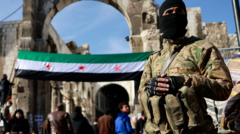In the western region of Syria, recent violent confrontations have escalated as loyalists of former President Bashar al-Assad ambushed government forces, resulting in the deaths of 14 interior ministry personnel. This incident occurs shortly after the quick overthrow of Assad’s regime, led by Ahmad al-Sharaa and his Islamist faction, Hayat Tahrir al-Sham (HTS). The ambush, which also left ten others injured, took place near Tartous, a port city that holds strategic importance for Assad's minority Alawite sect.
On Thursday, state media reported that security forces had initiated operations in Tartous in a bid to restore order, claiming to have neutralized several remnants of Assad's militias. Tensions have been further exacerbated by ongoing protests in various locations, including the cities of Homs, Tartous, and Qardaha, where residents are expressing fears about potential retaliatory actions against the Alawite community.
As the new authorities grapple with establishing a stable governance structure, the Alawite community, historically linked to the Assad regime's oppressive tactics, finds itself in a precarious position. Calls for a general amnesty for Alawites, made by some religious leaders, raise complexities given the numerous accusations of war crimes committed during Assad's presidency.
The Syrian Observatory for Human Rights (SOHR) has also reported casualties among the loyalist ranks. Furthermore, the government's imposition of a curfew in Homs signals the increasing difficulty faced by the new administration in asserting control and managing public safety amidst widespread calls for justice for past human rights abuses.
Amidst this backdrop, the new government struggles to quell unrest rooted in the community's desire for reconciliation and safety. As protests ensue over incidents like the burning of a Christmas tree, the responsibility to protect minorities and uphold human rights weighs heavily on the newly formed leadership, with the world watching closely as the future of Syria hangs in the balance.
The HTS, designated a terrorist organization by multiple countries, asserts its commitment to the rights of Syria's diverse ethnic and religious groups, yet skepticism remains due to their past actions. As protests continue to emerge, the challenges of governance are starkly clear; the effectiveness of the new regime may ultimately dictate the future stability of the war-torn nation.

















